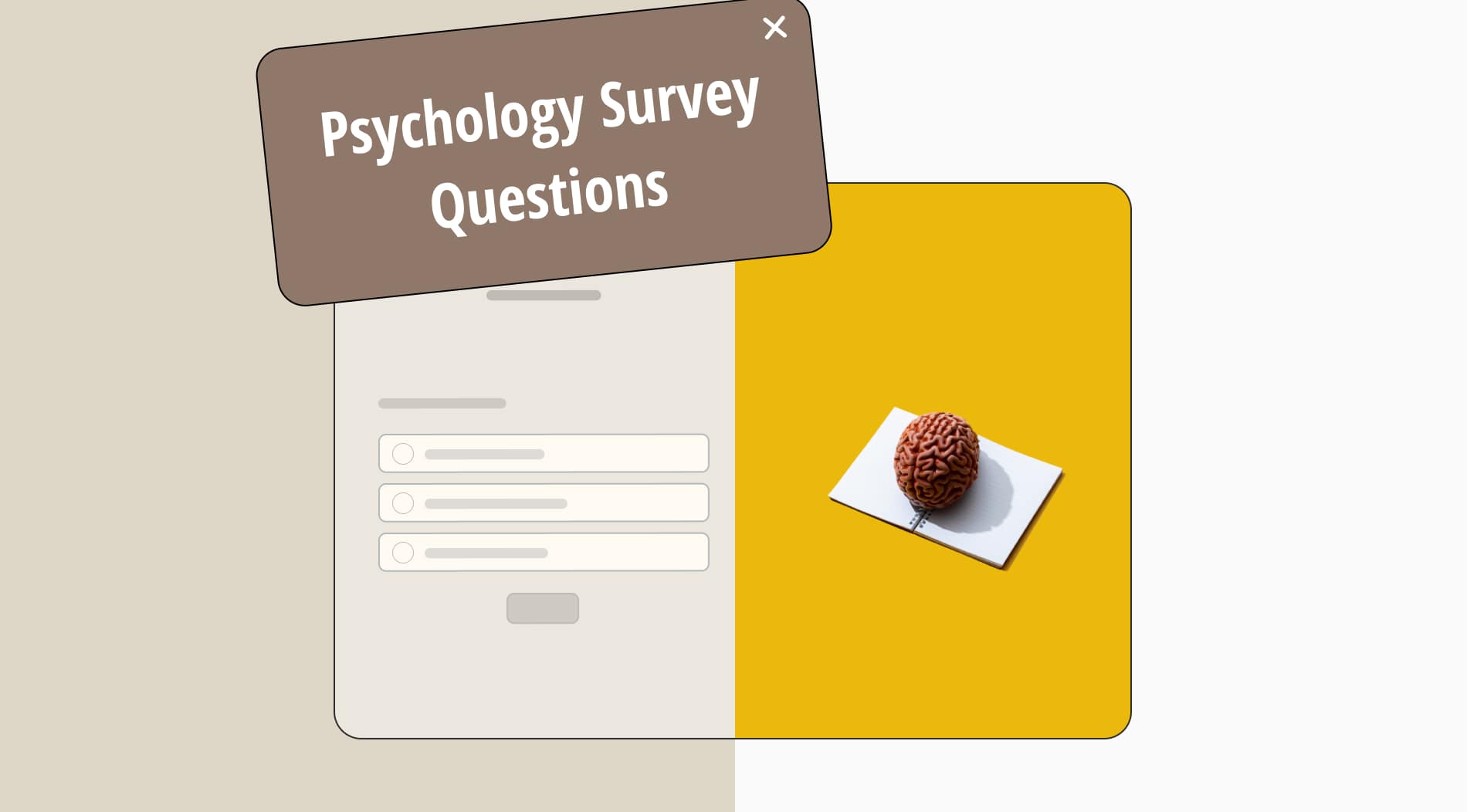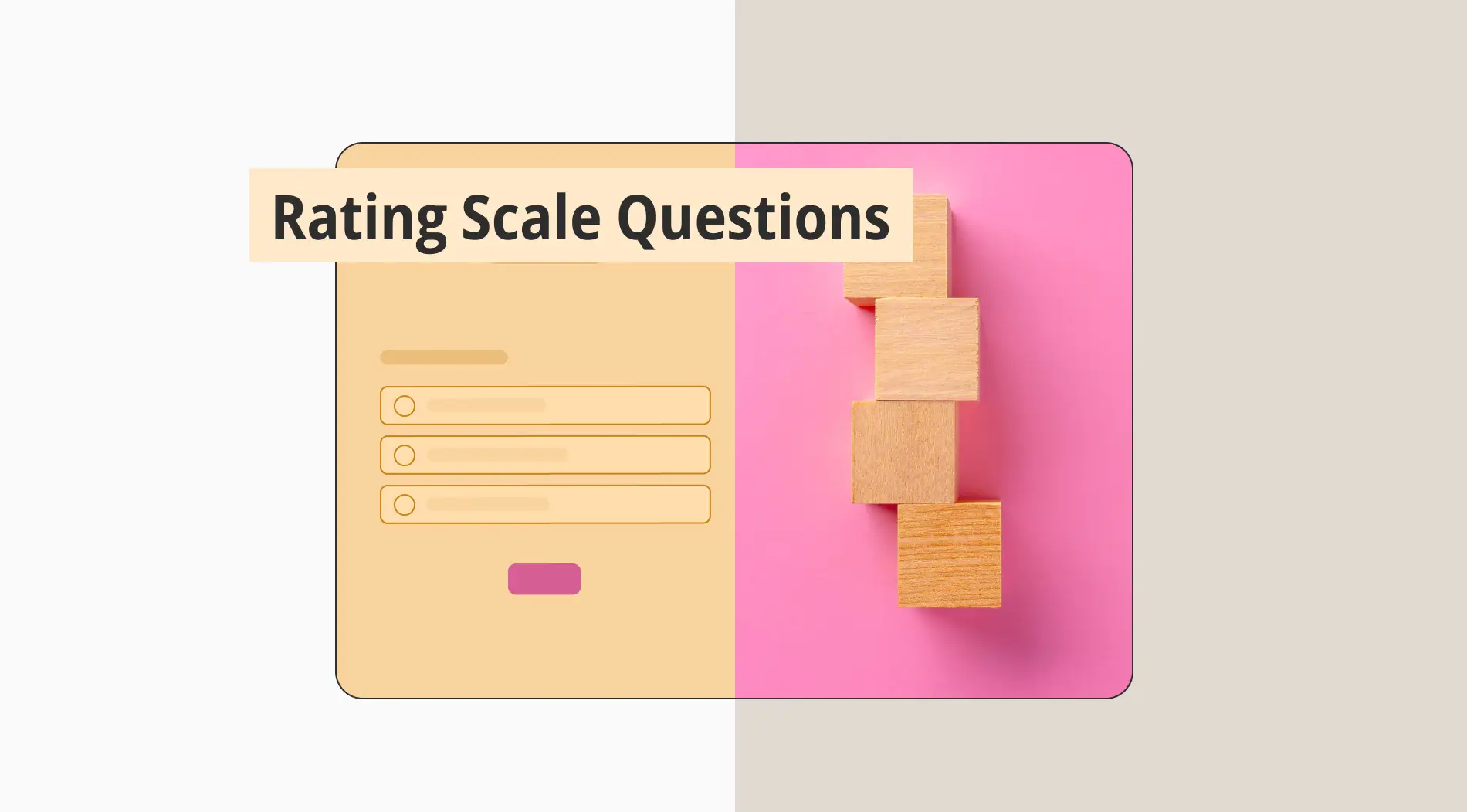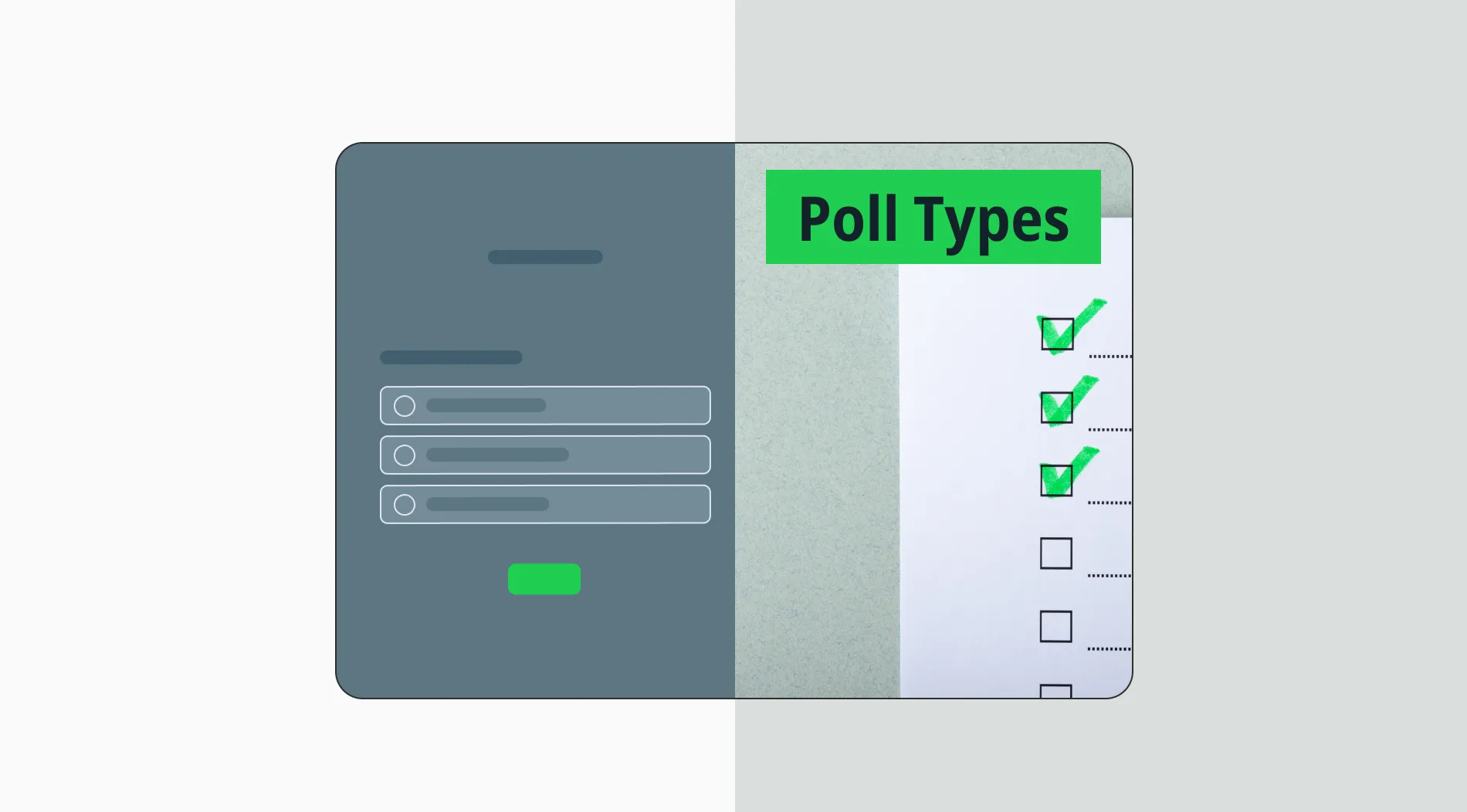Psychology surveys unlock the secrets of the mind and often have a revealing nature.
They are thought-provoking surveys and can explain a great deal about our points of view, perspectives, and behaviors. They also help us tackle the challenges we face during our daily lives and delve into long-standing preconceptions and specific characteristics.
Psychology survey examples may be for self-discovery, eligibility for a certain occupation, or evaluation of customers' reactions to a certain commodity. Regardless of its purpose, it is a great way to assess and work on certain psychological aspects of the respondents. In this article, we will tackle how to create a psychology survey with 30+ must-ask questions and useful tips.
What is a psychology survey?
A psychology survey is a type of questionnaire and research tool used to collect data on respondent’s thoughts, feelings, and behaviors.
It includes certain questions to study certain psychological reactions for scientific, professional, or commercial purposes. Psychology survey topics can include stress levels, immediate reactions, or consumer preferences (commercial).
Why do you need a psychology survey?
A psychology survey is crucial for understanding human behavior, feelings, attitudes, and mental states. It is a valuable research tool enabling insights into behavioral patterns and correlations. It not only enhances our understanding of psychological knowledge but also enables us to correlate between certain patterns and reach conclusions that will benefit both the surveyor and the respondent.
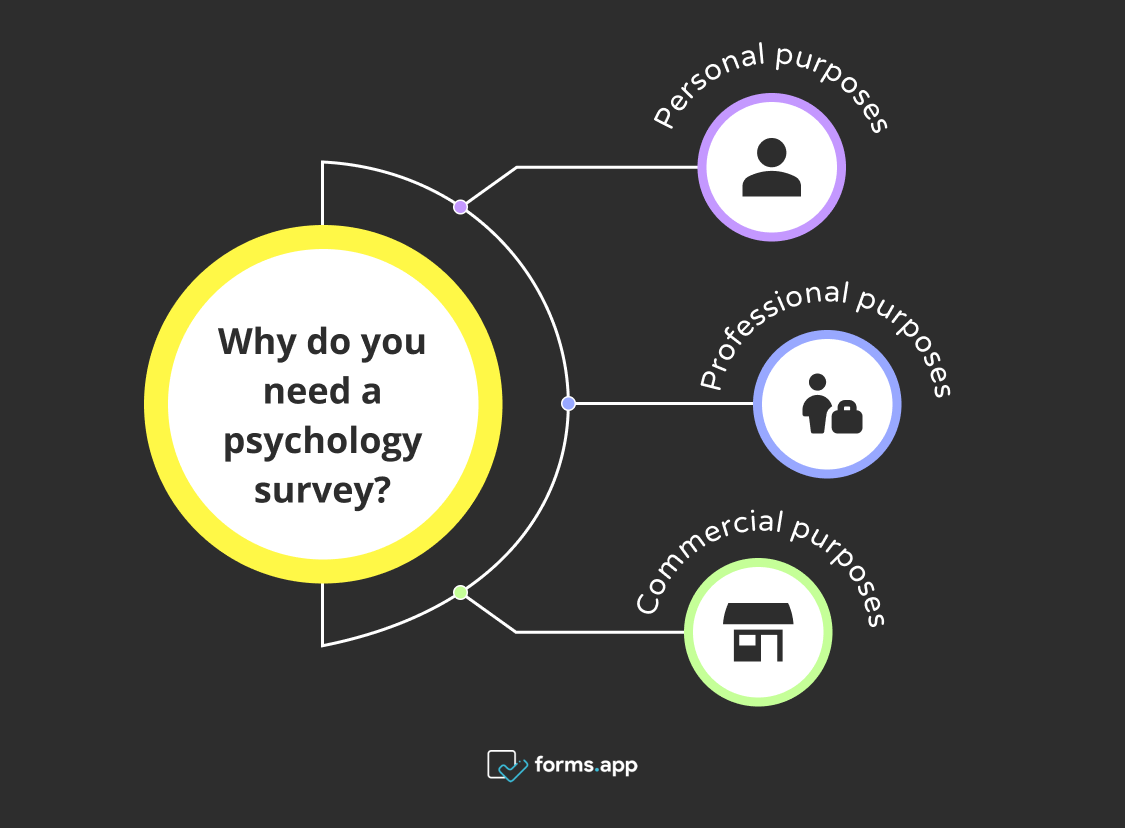
Reasons to conduct a psychology survey
A psychology survey can be required for many aspects of life and for a variety of reasons. The reasons vary from personal evaluations, professional assessments, or obtaining commercial knowledge. Each survey type has different focus groups, and the psychological topics can be as follows:
- Personal purposes: To determine stress levels gaining insights into any feelings or thoughts that may lead to psychological disorders.
- Professional purposes: To assess the applicant or employee's eligibility for certain jobs requiring specific psychological well-being, such as an HR specialist or clinical psychologist.
- Commercial purposes: Evaluate customer behaviors and monitor reactions to certain material or marketing policies.
30+ Must-ask psychology questions to use in your surveys
Every psychology survey has a different purpose, and their questions may differ; however, some of the questions are always similar. After a series of questions to help classify the respondents in accordance with their characteristics, each survey will contain different psychological questions in accordance with the purpose. Here are 30 must-ask research questions in a sample psychology survey:
1. What is your age range?
- 0 – 15
- 15 – 30
- 30 – 45
- 45+
- Prefer not to answer
2. What is your gender?
- Male
- Female
- Non-binary
3. What is your ethnicity?
4. In which country do you currently reside?
5. What is your highest level of education?
- Primary
- Secondary
- Vocational
- Bachelor’s Degree
- Master’s Degree
6. What is your current employment status?
- Employed,
- Unemployed
- Retired
7. What is your current relationship status?
- Single
- In relationship
- Married
- Divorced
8. What is your annual household income?
- 1000 - 2000 $
- 2000 - 5000 $
- 5000 - 10000 $
- 10000 - higher
9. What is your religious or spiritual affiliation?
10. Do you have any children, and if so, what is their age range?
- Yes, 0-6
- Yes, 6-18
- Yes, 18 or older
- No
11. How would you describe your overall level of life satisfaction?
12. On a scale from 1 to 10, how stressed do you feel on a daily basis?
13. How do you cope with stressful situations?
14. Are you generally an introverted or extroverted person?
15. How do you choose to handle conflicts in your social life?
16. What activities bring you the most joy and fulfillment?
17. Have you ever sought professional mental health support or counseling?
18. On a scale from 1 to 10, how satisfied are you with your current work or academic life?
19. What are your long-term objectives and plans?
20. Do you feel burdened by your current responsibilities?
21. Do you maintain a healthy work-life balance?
22. Did you ever find yourself in a case of conflict of interest?
23. What kind of feedback did you receive from your supervisor/manager?
24. How do these visual elements make you feel?
25. Which color makes you more comfortable in an environment?
26. How do these materials make you feel about yourself and your identity?
27. After seeing these visuals, do you find yourself daydreaming or imagining certain scenarios?
28. What kind of sounds make you feel relieved/relaxed?
- A crackling fireplace
- Sounds of nature
- Ambient music
- White noise
29. Do you find this tone of text overwhelming or informative?
30. Does this statement challenge your existential beliefs and perspectives?
How to craft a psychology survey
If you want to create and customize a psychology survey for any of the above reasons, you need to start by choosing an online survey tool. There are a lot of examples of psychology surveys online; however, forms.app can help you create the perfect psychology survey in the fastest way.
1- Choose a template, start from scratch, or generate with AI
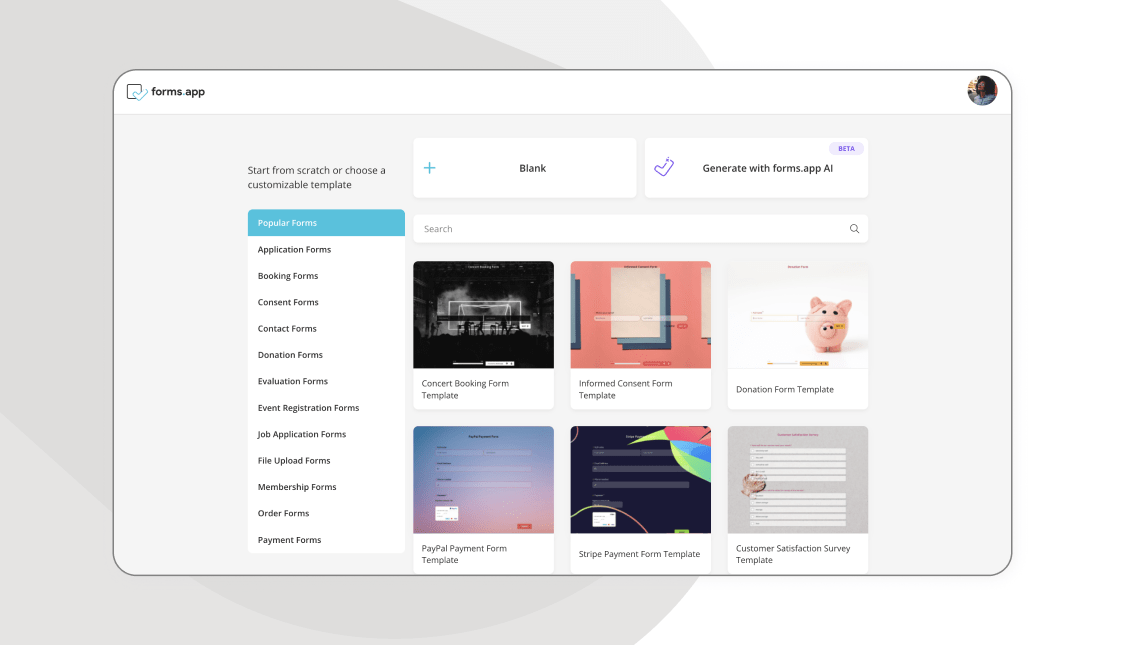
Choose a beginning option
You can choose a suitable template from a lot of templates in forms.app. You can customize them however you want. You can also start from scratch with your psychological research and decide on each of the details of your online survey. If you do not want to build your form from scratch, use the AI feature and generate questions/form fields.
2- Add questions and fields
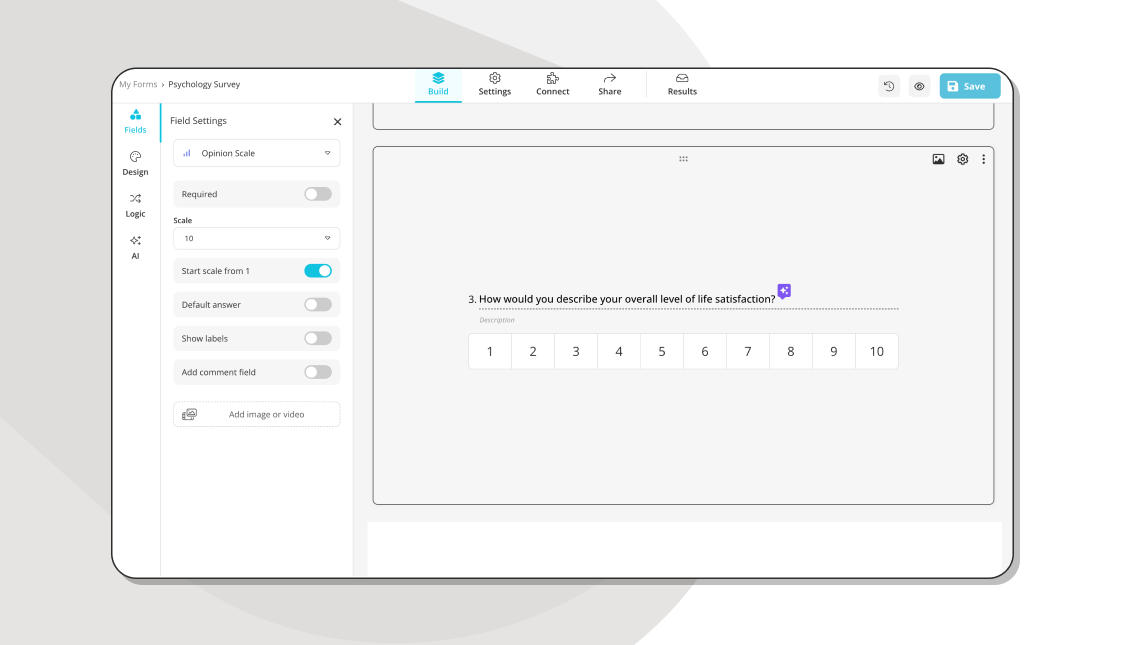
Add your questions
Add different types of form fields and questions and populate your form. After you start editing the template or the questions generated by AI, you have many options, from plain text to multi-selection, from opinion scale to star rating. You can also add dynamic form fields like drop-down selection and drawing.
3- Customize your form
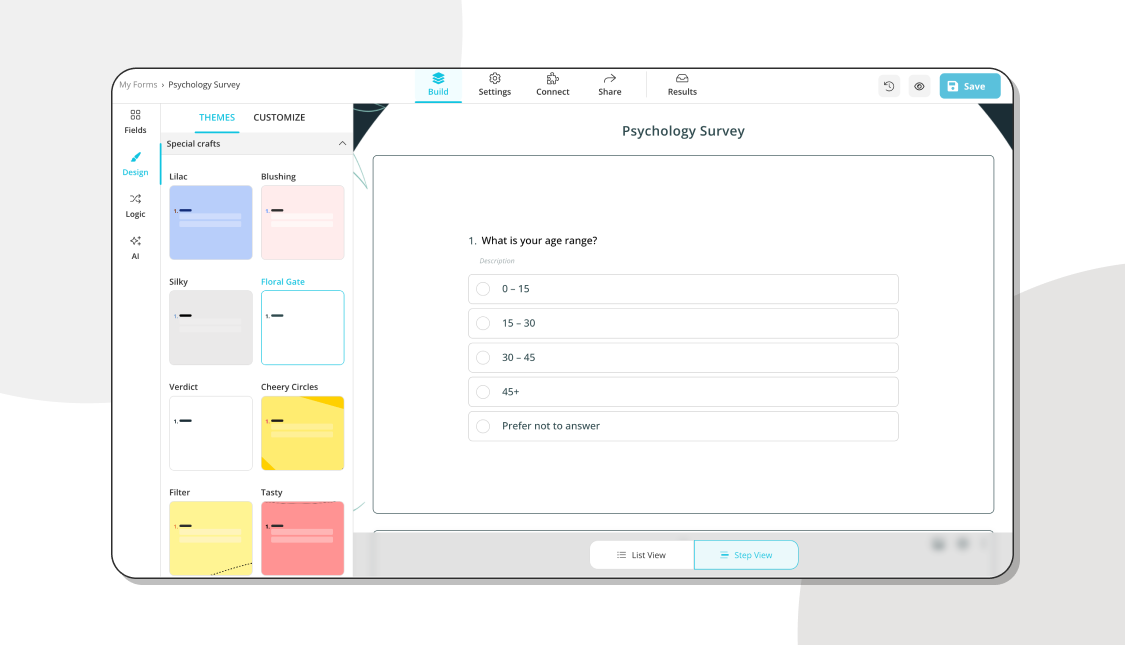
Customizing the design of your survey
Once you add your questions/form fields specific to your psychology research survey, you can also customize it by changing the background theme and adding images to make it more visually appealing. You can also add logic/rules to create multiple conditions for different answers and get more accurate survey data.
4- Share your form
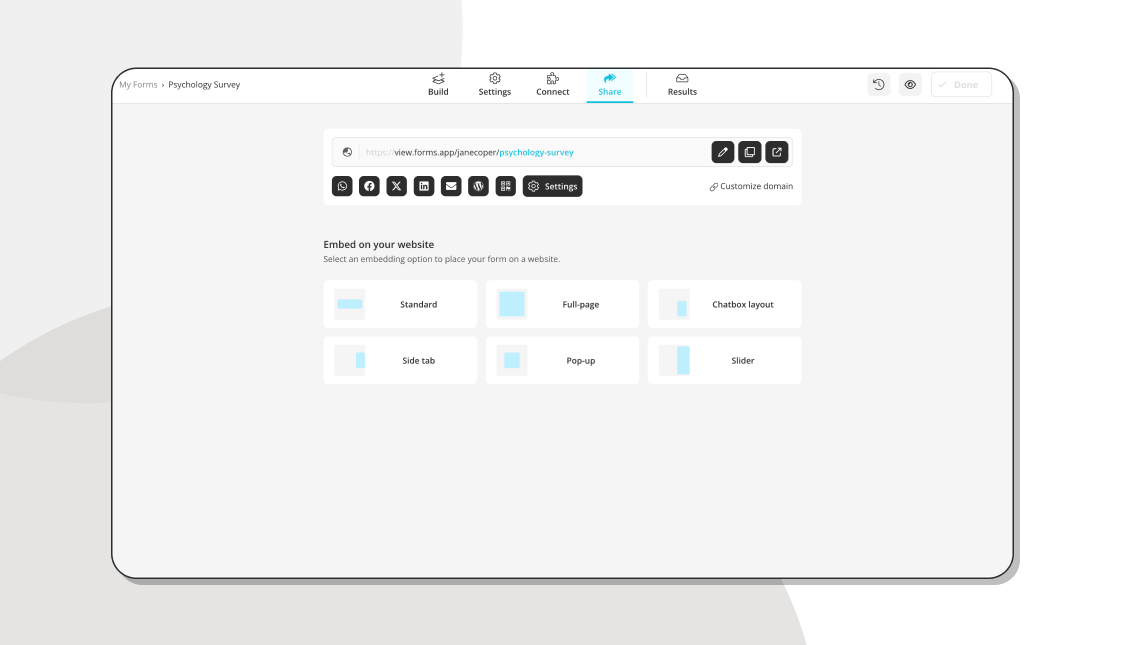
Check and share your survey
Once you finished customizing your form in accordance with your purposes and objectives, you can share your form with your respondents. You have many options for publishing your form, from sharing it via e-mail to even embedding it on your website.
6 tips for a better psychology survey
So far, we have covered what a psychology survey is, 30 useful questions to ask, and how to craft it in basic steps. However, if you want to create a professional and high-quality psychology survey, here 6 expert tips to help you:
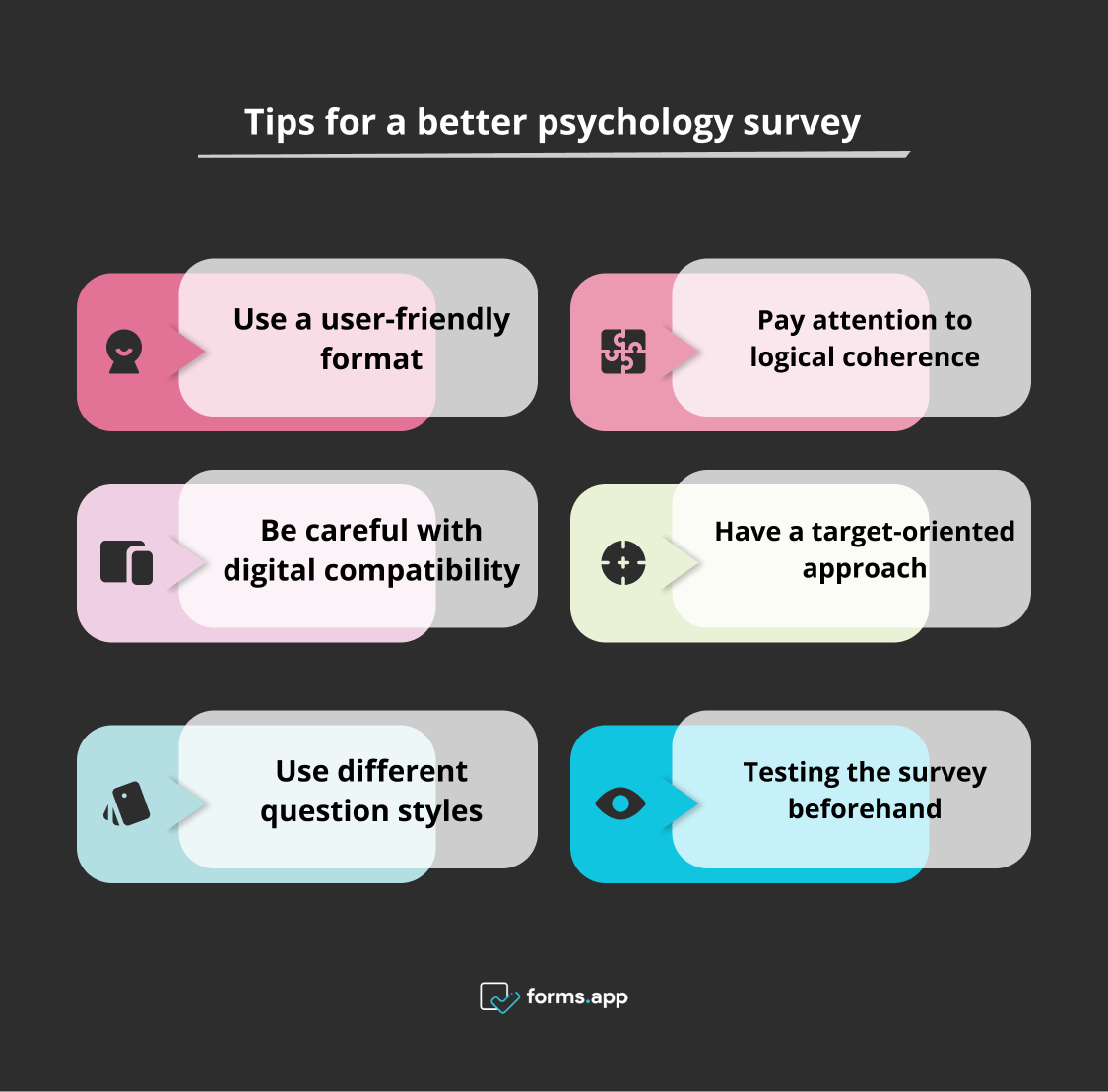
Tips for a better survey
1- Use a user-friendly format
Ensure your psychology form is visually appealing and has a user-friendly layout. This will promote participant engagement. Choose readable fonts and appealing colors. You will observe that the form encourages more thoughtful and accurate survey responses. Luckily, forms.app has just the features you need!
2- Pay attention to logical coherence
Organize your psychology survey questions in a proper flow. Following the logical flow will help you maintain participant focus and facilitate form completion. This will ensure that the respondents easily follow the flow of questions and also reduce the risk of confusion or frustration.
3- Be careful with digital compatibility
Optimize your psychology survey for mobile devices. Give them a choice to complete the form in an environment where they feel comfortable rather than sitting behind a computer at a designated place. A mobile-friendly design guarantees that respondents can easily complete the survey on any device, expanding your reach and participation.
4- Have a target-oriented approach
Adopt a target-oriented strategy by clearly defining your objectives and desired outcomes from your psychology survey. Avoid using offensive expressions/phrases in your survey, and tread carefully. This focused strategy enhances the survey’s efficiency and facilitates a more in-depth understanding of the psychological aspects under investigation.
5- Use different question styles
Tailor your form in a way that will enable you to get the most accurate answers to your questions. Do not just use plain text answers. You can use dynamic answer fields like opinion scale, selection matrix, or star rating. Remember, using plain text or multi-selection fields is not always the best solution.
6- Testing the survey beforehand
Before launching your psychology survey, test its functionality, display, and accessibility across devices and browsers. Meticulous testing ensures a proper and uninterrupted experience for participants and also enables you to identify and resolve potential issues. Make sure your test is perfect before it reaches your respondents and get the best response rates.
Wrapping up
In conclusion, psychology surveys are tools that tell us about many things about human behaviors. They have different purposes ranging from personal to professional or commercial, and each of them should be carefully crafted by considering the ultimate target audience.
In this article, we covered how to create a psychology survey with 30+ questions. Also, we highlighted the significance of ensuring mobile compatibility, adopting a target-oriented approach, putting different types of questions, and checking your test before launching. Following these guidelines will definitely bring you one step ahead.
Defne is a content writer at forms.app. She is also a translator specializing in literary translation. Defne loves reading, writing, and translating professionally and as a hobby. Her expertise lies in survey research, research methodologies, content writing, and translation.
